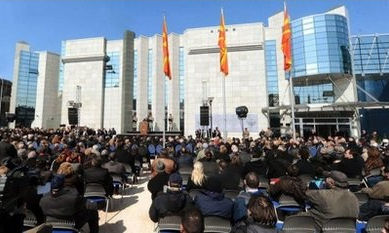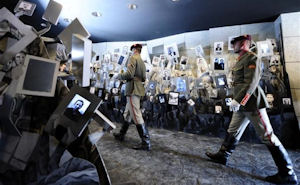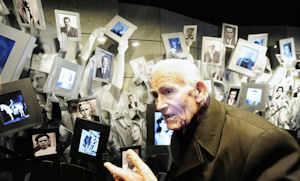Macedonia praised for honoring its Jews at opening of Holocaust memorial museum
11 Mar 2011 A museum dedicated to the memory of the Jews of Macedonia who perished in the Shoah has been inaugurated in the former Yugoslav republic, in the presence of the country’s president and representatives of international Jewish organizations, including the World Jewish Congress (WJC). In his speech, the WJC’s Research Director Laurence Weinbaum pointed out that no Jewish community in Europe had suffered a greater degree of destruction than the Macedonian one. Referring to Macedonia's principled stand on the restitution issue and to its unwavering friendship with Jews and Israel, he said: "In much of contemporary Europe, dead Jews are respected, but live ones are defamed. You honor the dead and the living, and in so doing you have set an example to which other nations should aspire. There are nations that are larger, richer, better known and more powerful than Macedonia, but none more decent, gracious, good-hearted and noble.”
A museum dedicated to the memory of the Jews of Macedonia who perished in the Shoah has been inaugurated in the former Yugoslav republic, in the presence of the country’s president and representatives of international Jewish organizations, including the World Jewish Congress (WJC). In his speech, the WJC’s Research Director Laurence Weinbaum pointed out that no Jewish community in Europe had suffered a greater degree of destruction than the Macedonian one. Referring to Macedonia's principled stand on the restitution issue and to its unwavering friendship with Jews and Israel, he said: "In much of contemporary Europe, dead Jews are respected, but live ones are defamed. You honor the dead and the living, and in so doing you have set an example to which other nations should aspire. There are nations that are larger, richer, better known and more powerful than Macedonia, but none more decent, gracious, good-hearted and noble.”
 In a video message to the event, US Secretary of State Hillary Clinton said that "this museum and memorial will document the long and rich history of Jewish life in the Balkans and honor the memories of those who perished in the Holocaust. Schoolchildren and visitors from throughout the region will be able to see their faces, hear their stories, and learn about their lives. The government of Macedonia has shown real leadership by enacting legislation resolving compensation claims for Jewish property stolen during the Holocaust and supporting the establishment of this memorial and museum. And today your entire nation can be proud of this effort." The modern, multi-million dollar edifice stands in the heart of what was once the city's Jewish Quarter, in the center of the Macedonian capital Skopje. It was built by the Jewish community of Macedonia, which today numbers some 100 members. Macedonian Jewry benefited from a 2002 law providing for the return of heirless Jewish property, a law that is widely recognized as one of the best in Europe.
In a video message to the event, US Secretary of State Hillary Clinton said that "this museum and memorial will document the long and rich history of Jewish life in the Balkans and honor the memories of those who perished in the Holocaust. Schoolchildren and visitors from throughout the region will be able to see their faces, hear their stories, and learn about their lives. The government of Macedonia has shown real leadership by enacting legislation resolving compensation claims for Jewish property stolen during the Holocaust and supporting the establishment of this memorial and museum. And today your entire nation can be proud of this effort." The modern, multi-million dollar edifice stands in the heart of what was once the city's Jewish Quarter, in the center of the Macedonian capital Skopje. It was built by the Jewish community of Macedonia, which today numbers some 100 members. Macedonian Jewry benefited from a 2002 law providing for the return of heirless Jewish property, a law that is widely recognized as one of the best in Europe.
 "The only surviving member of the 81-strong Misrahi family was my father," Viktor Misrahi (pictured on the left), one of the few Macedonian survivors still alive, told the news agency AFP. "Today, the ashes of our people were brought back here from Treblinka and they will remain here, at their home," he added. At the ceremony, Macedonia was hailed for enabling the Jews to regain the assets they had lost in the Shoah. The cornerstone for the museum was laid in 2005. Ljiljana Mizrahi, president of the local Holocaust Fund that had initiated the project, opened the ceremony by reading the names of some of the victims and explained that the museum would "preserve the memory of the Jews of Macedonia, not only commemorate their deaths, but also their lives and the civilization that perished with them."
"The only surviving member of the 81-strong Misrahi family was my father," Viktor Misrahi (pictured on the left), one of the few Macedonian survivors still alive, told the news agency AFP. "Today, the ashes of our people were brought back here from Treblinka and they will remain here, at their home," he added. At the ceremony, Macedonia was hailed for enabling the Jews to regain the assets they had lost in the Shoah. The cornerstone for the museum was laid in 2005. Ljiljana Mizrahi, president of the local Holocaust Fund that had initiated the project, opened the ceremony by reading the names of some of the victims and explained that the museum would "preserve the memory of the Jews of Macedonia, not only commemorate their deaths, but also their lives and the civilization that perished with them."
In his address, Macedonian President Gjorje Ivanov recalled the long history of co-habitation between Jews and Macedonians of other faiths and said that with the loss of the Jews "a part of Macedonia had been torn out and that on the Jewish streets of Skopje, Bitola and Stip, after the war there was silence." He went on to note Macedonia's support for Israel, which he said would continue.
In April 1941, Macedonia - then a part of Yugoslavia - was occupied by Bulgarian troops. In contrast to its policy back home, Sofia instituted a regime of terror and plunder against Macedonian Jews. That policy culminated in the deportation in March 1943 of some 7,200 Jews to the German death camp at Treblinka, from which not a single one returned. Some 98 percent of the Jews were killed. The only survivors were those who had managed to evade deportation, many of whom fought with the partisans.